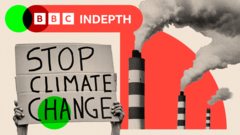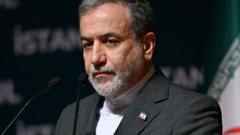The ongoing COP29 climate talks highlight a notable change in dynamics, with the US president-elect Donald Trump reconsidering America's involvement, while China steps up its commitment and leadership in negotiating climate action, indicating a pivotal shift in the global climate dialogue.
COP29: A Shift in Climate Leadership as China's Role Expands

COP29: A Shift in Climate Leadership as China's Role Expands
Amidst US withdrawal concerns, China's proactive stance at COP29 signals a potential transformation in global climate negotiations.
In what could be a defining moment for climate negotiations, COP29 has showcased a dramatic shift in dynamics. With US President-elect Donald Trump poised to withdraw the country from the climate process, the attention has turned towards China, which appears to be adopting a more proactive and cooperative role.
A recent conversation with a chief negotiator from one of the leading nations at the conference revealed frustrations regarding the stalled discussions, commonly referred to as the least productive COP to date. This sentiment is compounded by fears concerning Trump's stance on climate, as he has openly dismissed climate efforts as a "scam" and promotes significant increases in US oil production.
Despite the gloomy atmosphere, the negotiator pointed to China as a beacon of hope. Historically, China's role in COP talks has been ambiguous, fluctuating between alignment with developed countries and obstructive tactics on various issues. However, this year marks a significant departure, as China has demonstrated unprecedented transparency regarding its climate funding, having reportedly contributed over $24 billion to assist developing countries in climate initiatives since 2016—an unusually generous offering that took many observers by surprise.
As China continues to advocate for developing nations even while classified within the UN system as a developing country itself, questions arise regarding its increasing influence. With access to substantial capital aimed at facilitating the energy transition, China now focuses on emerging markets—vital hubs for future renewable energy consumption.
The implications of this change are twofold; while it signifies China’s growing economic clout in renewable technology, it is also reflective of a shifting landscape where traditional climate-driven leadership from the US and Europe may be declining. Experts suggest that China’s leadership approach might differ from that of its Western counterparts, likely opting for subtlety and pragmatism over overt ambition.
However, the broader challenges facing the COP process remain. Issues such as entrenched fossil fuel interests, particularly prominent from oil-producing nations like Saudi Arabia, continue to hinder progress. Observers suggest that while China could facilitate productive negotiations, it might also stall certain initiatives buffering the transition from fossil fuels.
COP29 represents more than typical political maneuvering; it embodies a global economic revolution as the renewable market expands. With China now holding a potential leadership role and the US on the sidelines, the unfolding developments in climate diplomacy will be critical in shaping both the future of energy investments and the direction of international climate efforts. As this landscape evolves, it highlights an ever-pressing need for all countries to engage collaboratively to avert a climate crisis and seize the economic opportunities that come with renewable energy solutions.
A recent conversation with a chief negotiator from one of the leading nations at the conference revealed frustrations regarding the stalled discussions, commonly referred to as the least productive COP to date. This sentiment is compounded by fears concerning Trump's stance on climate, as he has openly dismissed climate efforts as a "scam" and promotes significant increases in US oil production.
Despite the gloomy atmosphere, the negotiator pointed to China as a beacon of hope. Historically, China's role in COP talks has been ambiguous, fluctuating between alignment with developed countries and obstructive tactics on various issues. However, this year marks a significant departure, as China has demonstrated unprecedented transparency regarding its climate funding, having reportedly contributed over $24 billion to assist developing countries in climate initiatives since 2016—an unusually generous offering that took many observers by surprise.
As China continues to advocate for developing nations even while classified within the UN system as a developing country itself, questions arise regarding its increasing influence. With access to substantial capital aimed at facilitating the energy transition, China now focuses on emerging markets—vital hubs for future renewable energy consumption.
The implications of this change are twofold; while it signifies China’s growing economic clout in renewable technology, it is also reflective of a shifting landscape where traditional climate-driven leadership from the US and Europe may be declining. Experts suggest that China’s leadership approach might differ from that of its Western counterparts, likely opting for subtlety and pragmatism over overt ambition.
However, the broader challenges facing the COP process remain. Issues such as entrenched fossil fuel interests, particularly prominent from oil-producing nations like Saudi Arabia, continue to hinder progress. Observers suggest that while China could facilitate productive negotiations, it might also stall certain initiatives buffering the transition from fossil fuels.
COP29 represents more than typical political maneuvering; it embodies a global economic revolution as the renewable market expands. With China now holding a potential leadership role and the US on the sidelines, the unfolding developments in climate diplomacy will be critical in shaping both the future of energy investments and the direction of international climate efforts. As this landscape evolves, it highlights an ever-pressing need for all countries to engage collaboratively to avert a climate crisis and seize the economic opportunities that come with renewable energy solutions.






















